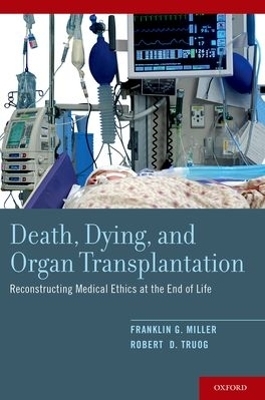
Death, Dying, and Organ Transplantation
Oxford University Press Inc (Verlag)
978-0-19-046084-6 (ISBN)
In Death, Dying, and Organ Transplantation: Reconstructing Medical Ethics at the End of Life, Miller and Truog challenge fundamental doctrines of established medical ethics. They argue that the routine practice of stopping life support technology in hospitals causes the death of patients and that donors of vital organs (hearts, lungs, liver, and both kidneys) are not really dead at the time that their organs are removed for life-saving transplantation. These practices are ethically legitimate but are not compatible with traditional rules of medical ethics that doctors must not intentionally cause the death of their patients and that vital organs can be obtained for transplantation only from dead donors.
In this book Miller and Truog undertake an ethical examination that aims to honestly face the reality of medical practices at the end of life. They expose the misconception that stopping life support merely allows patients to die from their medical conditions, and they dispute the accuracy of determining death of hospitalized patients on the basis of a diagnosis of "brain death" prior to vital organ donation. After detailing the factual and conceptual errors surrounding current practices of determining death for the purpose of organ donation, the authors develop a novel ethical account of procuring vital organs. In the context of reasonable plans to withdraw life support, still-living patients are not harmed or wronged by organ donation prior to their death, provided that valid consent has been obtained for stopping treatment and for organ donation.
Recognizing practical difficulties in facing the truth regarding organ donation, the authors also develop a pragmatic alternative account based on the concept of transparent legal fictions. In sum, Miller and Truog argue that in order to preserve the legitimacy of end-of-life practices, we need to reconstruct medical ethics.
Franklin G. Miller, Ph.D. is retired from the senior faculty in the Department of Bioethics, National Institutes of Health and currently Professor of Medical Ethics in Medicine at Weill Cornell Medical College. Dr. Miller has published a book of his selected essays, The Ethical Challenges of Human Research, edited six books, and published numerous articles in medical and bioethics journals on the ethics of clinical research, death and dying, professional integrity, pragmatism and bioethics, and the placebo effect. Dr. Miller is a fellow of the Hastings Center and Associate Editor of Perspectives in Biology and Medicine. Robert D. Truog, MD. is the Frances Glessner Lee Professor of Medical Ethics, Anaesthesia, & Pediatrics and Director of the Center for Bioethics, both at Harvard Medical School. He has practiced pediatric intensive care medicine at Boston Children's Hospital for more than 25 years.
Preface ; 1. Withdrawing Life-Sustaining Treatment: Allowing to Die or Causing Death? ; 2. Active Euthanasia ; 3. Death and the Brain ; 4. Challenges to a Circulatory-Respiratory Criterion for Death ; 5. Donation after Circulatory Determination of Death ; 6. Vital Organ Donation without the Dead Donor Rule ; 7. Legal Fictions Approach to Organ Donation ; 8. Epilogue
| Erscheinungsdatum | 31.01.2016 |
|---|---|
| Verlagsort | New York |
| Sprache | englisch |
| Maße | 155 x 231 mm |
| Gewicht | 318 g |
| Themenwelt | Medizin / Pharmazie ► Medizinische Fachgebiete ► Chirurgie |
| Medizin / Pharmazie ► Medizinische Fachgebiete ► Medizinethik | |
| Medizin / Pharmazie ► Medizinische Fachgebiete ► Palliativmedizin | |
| Studium ► Querschnittsbereiche ► Geschichte / Ethik der Medizin | |
| ISBN-10 | 0-19-046084-9 / 0190460849 |
| ISBN-13 | 978-0-19-046084-6 / 9780190460846 |
| Zustand | Neuware |
| Haben Sie eine Frage zum Produkt? |
aus dem Bereich


